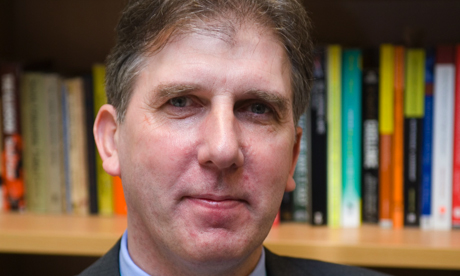Linking salary with performance is ‘nonsense’ says superhead Ken Warman

BSix Brooke House Principal Ken Warman
Ken Warman has been Principal of BSix Brooke House since 2004.
In 2012 he was named Principal of the Year by The Learning and Skills Improvement Service.
The all-ability sixth-form college, which mixes academic and vocational study, was awarded for Innovation in Teaching and Learning at the Times Education Supplement Further Education Awards 2012.
Last month Mr Warman spoke to the Hackney Citizen about raising aspirations and his dislike of performance-related pay.
Hackney Citizen: Ken Spours of the University of Education told us you are “doing something radical”. What did he mean?
Ken Warman: One thing he may be referring to is our Raising Aspirations programme.
In 2008 we launched a partnership with Pembroke College, Oxford.
It’s a year-long course of academic preparation for university study.
Pupils do a week at Pembroke like an undergraduate.
They sit an essay, they have got undergraduates and postgraduates helping them, and then, at the end, they have to read it out to a tutor – so it’s just like being at Oxford.
HC: You also run a scheme called BSeven. What’s that about?
KW: BSeven was launched in 2010. The idea is that rather than doing a collection of qualifications within in an overarching framework, you do a lot of other things as well.
A lot of our students won’t get the skills or qualities necessary for work or university from home or from their peers, nor from an A-level.
We pay a lot of attention to things beyond the classroom like political involvement, involvement in diversity events and student participation.
HC: What is your view on performance-related pay?
KW: I think performance-related pay is nonsense. Teachers don’t come into the profession for the money.
That’s not the reward for the job.
I think the idea that people would do it for two-grand extra is neither here nor there.
I’ve been on perfomance-related pay before – I was in a college in West London, and it was in a mess, and I spent three years sorting it out, and I got no performance-related pay whatsoever because the results were poor. But I was putting it right underneath it all.
So after three years and we’d sorted it out.
I leave, and the person who inherits my job gets performance-related pay. So performance-related pay doesn’t necessarily reward performance.
There is also a question of how you achieve that performance because if you say ‘we’re going to reward you if the results go up’ , I could get my results up by kicking people out, for example.
Or completely drilling you in such a way that it is not educational, so pay is not the driver at all, I don’t think.
But pay is important and at the moment teachers are struggling because of pay freezes and pension changes, so their real, take-home pay is coming down.
A general elevation of pay would be the best solution. Then deal with people who are underperforming.
HC: You won Principal of the Year in 2012. How do you compare to Mossbourne’s superhead, Sir Michael Wilshaw?
KW: I would say that we are probably not as disciplinarian as it sounds like it is at Mossbourne, and we are certainly not as selective.
If you look at their sixth form it is highly selective, so that would be one example of how you can get really good results by cherry-picking who you want in your sixth form.
We don’t do that because young people who have not got Bs and As at GCSE still need further education, and somebody has got to provide it.
That is our goal.
But equally we can cope with people who could have stayed in a highly selective sixth form.
I never understood why you cannot do both in the same building.
HC: Do you think England’s education provision is in danger of having too much choice?
KW: It is getting more and more competitive and you get more and more decisions being made in the interests of the institution rather than in the interests of the young people themselves.
You have to protect yourself because you’re in a competitive environment.
Because of the free market the whole education provision is indeed fragmented, but there is also a coming-together.
For example Bethnal Green Academy have approached us about having a planned progression for students who are not going to stay in their sixth form.
Partnerships are still happening because they are necessary, and I think some schools are realising that just going after your own interest is not necessarily going to make you more effective.
So even from a purely self-interested point of view it’s not an intelligent thing to do.
